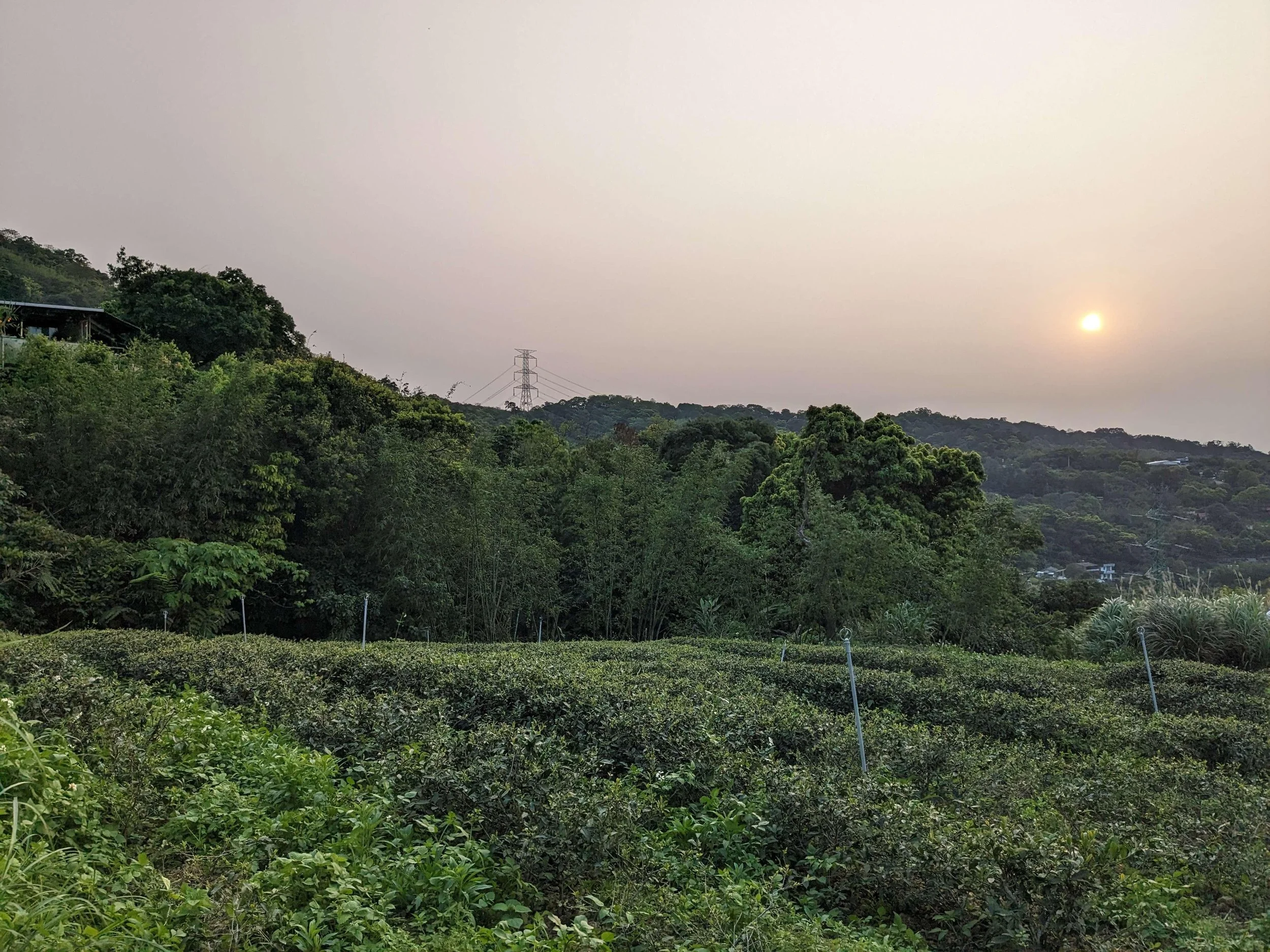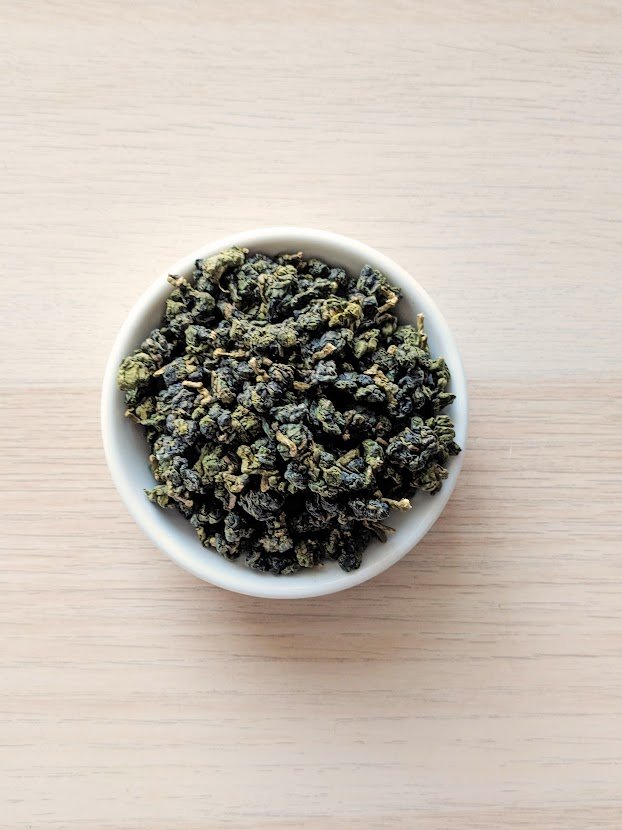Muzha Tieguanyin
Electric roast oolong | Muzha, Taiwan
Don’t sleep on this one — there’s a reason why we proudly carry this tea alongside the more hardcore Traditional Muzha Tieguanyin. The use of the Jin Xuan cultivar here makes this a little more sweet and fruity than usual, but it still lives up to classic Tieguanyin’s vibrant and resonant character. Really delicious.
Muzha Tieguanyin 木柵鐵觀音茶
Spring 2022 harvest from Muzha, Taiwan
Rich and balanced flavors with a sparkling sweet-tart note — a characteristic of good Muzha Tieguanyin. Surprising amount of character.
Harvest: Spring 2022
Roast: Winter 2022
Elevation: 250m (820 ft)
Process: handpicked, medium-high oxidation, deep electric roast
Type: roasted oolong
Origin: Maokong, Muzha District — Taiwan
Cultivar: Jin Xuan
Garden: Organic
About this batch:
Wow, delicious!
We picked up this batch after we’d already purchased the Light Roast Traditional and Dark Roast Traditional Muzha TGY… which is a testament to how well this humble tea stands up to some really hardcore Tieguanyin.
Super tasty, with a sparkling sweet-tart fruity character. It’s shocking how much this batch, made with Jin Xuan, still echoes back to the heart of Muzha Tieguanyin’s signature sweet-sour flavor, which comes from the OG cultivar. The teamaker says this effect comes from the quality of Muzha’s soil. Jin Xuan, usually a pretty mellow and straightforward cultivar that makes mellow and straightforward teas, apparently becomes surprisingly complex in the unique and particularly acidic soil of Muzha. And in the hands of a skilled producer and teamaker, of course!
About the tea: A delicious and easy drinking Muzha Tieguanyin.
If this is your first Muzha Tieguanyin, this is a fantastic introduction to a tea that’s an old-school favorite for good reason.
And if you already like Muzha Tieguanyin, you might be pleasantly surprised by how wonderful this is for the price. :) I know we were!
Lovely delicious roasted oolong character as you’d expect, with a distinctive sparkling sweet-tart fruity character that’s signature to Muzha Tieguanyin. Sweet from the confident roast, smooth without being boring, and a tea that’s really easy to enjoy everyday or break out to share with others who you’d like to bring over to the roasted oolong side :)
About this style of tea:
Muzha Tieguanyin 木柵鐵觀音 is a really wonderful style of roasted oolong made in Muzha in northern Taiwan, right on the outskirts of the capital Taipei. This is a very old tea growing region that’s among one of the first to cultivate tea in Taiwan. The unique soils of Muzha were said to have been very similar to the soils of Anxi, hometown of Tieguanyin in mainland China, which is partly why Tieguanyin flourished so well as a cultivar here.
Muzha Tieguanyin not the most popular tea on the market nowadays, as the current trend for tea in Taiwan has favored high mountain teas for many decades now. So Muzha Tieguanyin is often seen as an old-school style of tea — bordering on outdated in the eyes of some, but an underrated treasure in the eyes of others. Tea is subjective of course, but as for us, omg, we love it!!
Traditionally, Muzha Tieguanyin was made with the Tieguanyin cultivar, which was first brought over to Taiwan from mainland China in 1895. To get even more specific, Muzha has a particular strain of Tieguanyin called Hong Xin Wai Wei Tao, which, if we want to be strict about the definition of Tieguanyin, should be the cultivar used to make this style of tea.
We love Hong Xin Wai Wei Tao to bits — and you can try that style of traditional Tieguanyin with our Light Roast Traditional Muzha Tieguanyin and our Dark Roast Traditional Muzha Tieguanyin,
But most Muzha Tieguanyin nowadays is actually made with other, more commonplace Taiwanese cultivars, like Qing Xin, Jin Xuan, and Si Ji Chun. That’s true even in Muzha itself (like, it’s not just an issue outside the authentic growing region) and even among the teas that are entered into the tea competitions this year. It’s just been generally accepted that these other cultivars can be used to make Muzha Tieguanyin as well. That’s mostly because Hong Xin Wai Wei Tao, the OG cultivar, is notoriously difficult to cultivate and a little harder to work with processing-wise to get a good result.
Anyway, it’s a fun debate to get into, but nonetheless there’s still a lot of merit to both the super hardcore OG Hong Xin Wai Wei Tao Muzha Tieguanyin, and this Muzha Tieguanyin.
This batch — made with the Jin Xuan cultivar and finished with an electric roast — is an expression of the Muzha Tieguanyin most found in the area nowadays, and we think it’s pretty lovely.
We carry three Muzha Tieguanyin teas:
the one on this page, the more modern Muzha Tieguanyin made with the Jin Xuan cultivar and finished with an electric roast,
and two traditional Muzha TGY: the Light Roast Traditional Muzha TGY and the Dark Roast Traditional Muzha TGY, both made from Hong Xin Wai Wei Tao and finished with longan charcoal.
About the Muzha Tieguanyin cultivar debate:
Hmmm? Is it really okay to call this tea “Muzha Tieguanyin” when it’s made with the Jin Xuan cultivar, rather than super OG Tieguanyin?
That’s really quite the debate we’re walking into, not just on the consumer side, but on the ground in Muzha as well.
If we want to use the most technical criteria, only Tieguanyin made from the original Hong Xin Wai Wei Tao cultivar, and ideally with a deep charcoal roast, can be considered “real”, traditional Muzha Tieguanyin.
And there’s merit to being a little purist about it — we’re head over heels for traditional Muzha Tieguanyin ourselves — but really if you walk around Muzha today, most tea producers you meet would readily call this Muzha Tieguanyin. Same goes for the smart and experienced folks who judge the Muzha tea competitions, where most of the winning teas are made with modern cultivars as well. In the right hands, like in this case, Jin Xuan can express really beautiful fruity and sparkling sweet-tart flavors.
That debate will inevitably continue, but it’s a debate that can become fun and illuminating, rather than pedantic if we take the right approach. Why not try both types of Tieguanyin and see why folks are talking about all this in the first place? :)
We genuinely like them both and think that, as long as the most traditional style doesn’t go away completely, the market is better off having many happy options.










